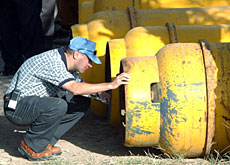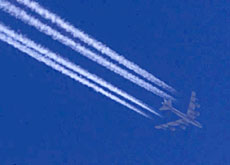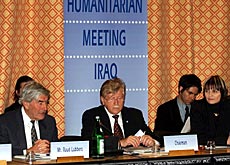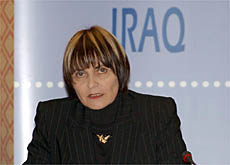US allowed limited use of Swiss airspace

The United States has been given permission to use Swiss airspace for humanitarian and medical flights, as well as for surveillance missions over Iraq.
However, the Swiss government on Friday repeated that it would not allow military flights over Switzerland.
Clarifying its position on the use of Swiss airspace, the government said the conditions would remain in place unless there was war in Iraq.
The Swiss foreign minister, Micheline Calmy-Rey, stressed that flights of a military nature – carrying troops or supplies – would not be allowed.
On Wednesday, the Swiss cabinet revealed it had rejected a request from the US for military flights over Switzerland, claiming such a move would compromise the country’s traditional neutrality.
The situation, however, would change if there was a second United Nations resolution mandating action against Iraq, or if the US and its allies chose to act unilaterally.
Calmy-Rey said that in the case of a second UN resolution, Switzerland would examine requests for fly-over rights on a case-by-case basis.
In the event of the US going it alone, Swiss neutrality would prevail, she added.
Open airspace
Speaking in Paris on Thursday, the Swiss president, Pascal Couchepin, signalled that Switzerland would open its skies to US military aircraft if the UN authorised an attack on Iraq.
He said Switzerland could endorse such action if a new, “clear” resolution was agreed by the Security Council.
“If the basis for American intervention is a mandate from the United Nations, Switzerland can, under its policy of neutrality, authorise the passage of American planes,” he said.
Last resort
Pierre Helg, Switzerland’s deputy permanent representative to the UN in New York, told the Security Council on Wednesday that force should only be used once “all peaceful means have been exhausted”.
Helg’s address – Switzerland’s first detailed statement to the Security Council on the Iraq crisis – also highlighted last weekend’s humanitarian conference held in Geneva.
More than 30 countries, as well as some 20 humanitarian organisations attended the meeting, launched by the Swiss foreign minister last month.
“The participants acknowledged that an armed conflict… would very probably have grave consequences for the local civilian populations, not only in Iraq where the situation is already precarious, but also in neighbouring countries,” Helg said.
Chemical weapons
He added that Switzerland did not underestimate the risk of weapons of mass destruction.
“However, we are deeply concerned about the prevailing situation in the region… and the impact on this situation of a violent shock wave provided by hasty military action.”
Helg said Switzerland accepted the argument that a willingness to use force was needed to strengthen the position of UN inspectors.
“The Security Council must continue to persevere with determination. And if this option fails, we recall that in any case the use of force must be authorised by a Security Council resolution,” he said.
“Iraq holds the key to solving this crisis,” Helg said.
“Switzerland appeals to the Iraqi government to act in the true interests of its country.”
swissinfo, Jacob Greber

In compliance with the JTI standards
More: SWI swissinfo.ch certified by the Journalism Trust Initiative











You can find an overview of ongoing debates with our journalists here . Please join us!
If you want to start a conversation about a topic raised in this article or want to report factual errors, email us at english@swissinfo.ch.